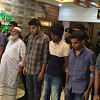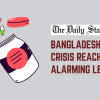Unlocking the potential of health corners for a healthier future

Recalling Fotik from the Chuti short story vividly brings to light the turbulent nature of adolescence, a phase where understanding is scarce, and a sense of belonging seems elusive. Engaging in discussions about sensitive topics such as sexual reproductive health, pregnancy, drug abuse, and eve teasing during this period can be a daunting task. Adolescents often find it challenging to trust adults with their experiences, and likewise, adults may feel uncomfortable broaching these subjects. Consequently, these crucial conversations often occur among peers, resulting in misguided decisions and potential pitfalls.
The Ministry of Health and Family Welfare of Bangladesh has offered a commendable solution to address the challenges faced by the adolescent population. By establishing adolescent-friendly health corners in upazila health complexes across different districts, the ministry has created dedicated spaces exclusively for adolescents. These corners, staffed by Sub-Assistant Community Medical Officers (SACMOs), are adorned with informative materials, including books and posters. Here, adolescents, both boys, and girls, can comfortably spend time reading, engaging in discussions, and seeking guidance from SACMOs on various issues such as menstruation, early marriage, pregnancy, contraceptives, family planning, RTI/STI prevention, gender-based violence, puberty, and substance abuse. The initiative ensures privacy and proper guidance for adolescents during this critical stage of life.
Despite the effectiveness of these adolescent-friendly health corners, a significant challenge remains—the lack of awareness among the target audience. To fully realise the potential of this initiative, it requires increased publicity. In a country where 36 million adolescents make up one-fifth of the total population, guiding this substantial demographic is crucial for building a healthier nation in the future. Creating awareness, establishing safe spaces for discussions, and informing adolescents about their rights regarding sexual reproductive health, early marriages, and other sensitive topics will not only educate them but also empower them to become confident individuals ready to navigate the complexities of adulthood.
Semonty Jahan is a research associate at BRAC James P Grant School of Public Health, BRAC University.
Views expressed in this article are the author's own and do not reflect those of any organisation, institution or entity with which he is associated.
Follow The Daily Star Opinion on Facebook for the latest opinions, commentaries and analyses by experts and professionals. To contribute your article or letter to The Daily Star Opinion, see our guidelines for submission.


 For all latest news, follow The Daily Star's Google News channel.
For all latest news, follow The Daily Star's Google News channel. 








Comments